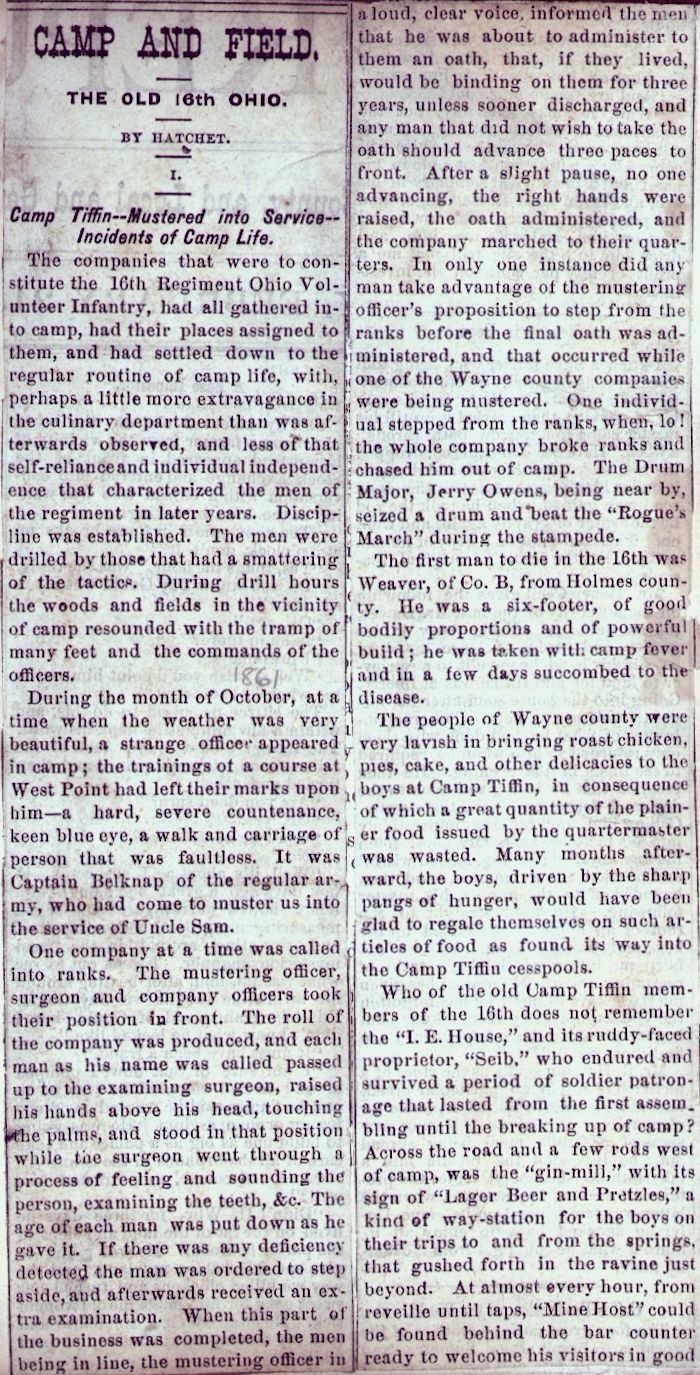| Camp & Field Index Page | 16th OVI Home Page | Camp & Field Page 2 |
The Camp & FieldArticles by Theodore Wolbach |
 Cpl. Theodore D. Wolbach |
The following image is taken from a book titled "Mortality and Statistics of the Census of 1850" in which it is believed retired Captain Rezin H. Vorhes, Company H, pasted over the pages a series of articles written by Cpl. Theodore D. Wolbach, Company E, titled "Camp and Field" and published, by chapter, in the Holmes County (Ohio) Republican newspaper from February 24, 1881 to August 17, 1882. The articles tell the story, in great detail and color, of the 16th OVI, from the inception of the 3-year regiment in October, 1861, through all its camps, battles and marches until it was disbanded on October 31, 1864. The articles pasted in the Vorhes book cover the first 35 chapters, published through October 20, 1881. All the remaining chapters were recently found in a Holmes County library by researcher Rob Garber who obtained copies, performed the transcriptions and provided to this website and which are also presented here, thus providing the complete work by Theodore Wolbach.
Throughout these articles click on the underlined white text for additional details.
The webauthor thanks 16th Ohio descendant Rob Garber for his excellent research on the Camp And Field articles and for performing the tedious digital transcription of those articles found on each page. The transcriptions were made to reflect the original articles verbatim, misspellings and all. Rob is the 3rd great nephew of Capt. William Buchanan, Company F, 16th Ohio, who served in the 90-day regiment as a private, re-enlisting in the three year regiment, and eventually making the rank of Captain of Company F. Thanks Rob!
Page 1 - Chapter 1 - October, 1861
 |
Published in Holmes County Republican CAMP AND FIELD. The Old 16th Ohio.
I. Camp Tiffin--Mustered into Service--Incidents of Camp Life. The companies that were to constitute the 16th Regiment Ohio Volunteer Infantry, had all gathered into camp, had their places assigned to them, and had settled down to the routines of camp life, with, perhaps a little more extravagance in the culinary department than was afterwards observed, and less of that self-reliance and individual independence that characterized the men of the regiment in later years. Discipline was established. The men were drilled by those that had a smattering of the tactics. During drill hours the woods and fields in the vicinity of camp resounded with the tramp of many feet and the commands of the officers. During the month of October, at a time when the weather was very beautiful, a strange officer appeared in camp; the trainings of a course at West Point had left their marks upon him--a hard, severe countenance, keen blue eye, a walk and carriage of person that was faultless. It was Captain Belknap of the regular army, who had come to muster us into the service of Uncle Sam. One company at a time was called into ranks. The mustering officer, surgeon and company officers took their position in front. The roll of the company was produced, and each man as his name was called passed up to the examining surgeon, raised his hands above his head, touching the palms, and stood in that position while the surgeon went through a process of feeling and sounding the person, examining the teeth, &c. The age of each man was put down as he gave it. If there was any deficiency detected, the man was ordered to step aside, and afterwards received an extra examination. When this part of the business was completed, the men being in line, the mustering officer in |
a loud, clear voice, informed the men that he was about to administer to them an oath, that, if they lived, would be binding on them for three years, unless sooner discharged, and any man that did not wish to take the oath should advance three paces to front. After a slight pause, no one advancing, the right hands were raised, the oath administered, and the company marched to their quarters. In only one instance did any man take advantage of the mustering officer's proposition to step from the ranks before the final oath was administered, and that occurred while one of the Wayne county companies were being mustered. One individual stepped from the ranks, when, lo! The whole company broke ranks and chased him out of camp. The Drum Major, Jerry Owens, being near by, seized a drum and beat the The first man to die in the 16th was Weaver, of Co. B, from Holmes county. He was a six-footer, of good bodily proportions and of powerful build; he was taken with camp fever and in a few days succombed [sic] to the disease. The people of Wayne county were very lavish in bringing roast chicken, pies, cake, and other delicacies to the boys at Camp Tiffin, in consequence of which a great quantity of the plainer food issued by the quartermaster was wasted. Many months afterward, the boys, driven by the sharp pangs of hunger, would have been glad to regale themselves on such articles of food as found its way into the Camp Tiffin cesspools. Who of the old Camp Tiffin members of the 16th does not remember the |
| Camp & Field Index Page | 16th OVI Home Page | Camp & Field Page 2 |